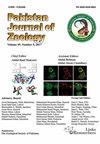蜂蜜和黑籽协同促进铜酮中毒鹌鹑脑少突胶质细胞再生
IF 0.5
4区 生物学
Q4 ZOOLOGY
引用次数: 0
摘要
多发性硬化症(MS)是一种复杂的疾病,以脱髓鞘和中枢神经系统神经元轴突部分丧失为特征,涉及多种遗传和环境因素。虽然,脱髓鞘病变在整个大脑中发展,但更常见的是广泛的白质。目前,有三种不同的方法被用于治疗多发性硬化症,其中合成药物是最常用的,但它们不能治愈这种疾病。其次,干细胞疗法在治疗人类多发性硬化症方面也取得了有限的成功。第三种方法是使用激素,这是最有效的方法,但也有一些明显的副作用。另外,天然产品可以潜在地作为一种负担得起的和有效的替代治疗MS最小或没有副作用。黑籽(Nigella sativa)和蜂蜜具有有效的神经保护、抗氧化和抗炎特性,无副作用,可以作为动物模型和人类MS的替代补救治疗的潜在候选物。本研究建立了一种新的动物模型(鹌鹑),研究了蜂蜜和黑籽对鹌鹑脑内脱髓鞘的协同作用。试验选用35只雄性鹌鹑,其中10只未处理,25只连续6个月给予200 mg/kg/d铜酮脱髓鞘诱导脱髓鞘。然后将它们分为7组,每组5只动物,其中3组CPZ处理组在脱髓鞘后给予蜂蜜、黑籽油或两者的混合物6周。在治疗结束时进行行为测试。组织学检查后,测定小脑白质中少突胶质细胞的数量。结果发现三种处理均能有效诱导髓鞘再生。有趣的是,蜂蜜和黑籽的混合物比单独使用蜂蜜和黑籽的效率要高得多。我们的数据支持在多发性硬化症患者中给药藜麦和蜂蜜的临床试验的需要。本文章由计算机程序翻译,如有差异,请以英文原文为准。
Honey and Black Seed Synergistically Promote Regeneration of Oligodendrocytes in Cuprizone Intoxicated Quail Brain
Multiple sclerosis (MS) is a complex disorder, characterized by demyelination and loss of axonal parts of neurons in the central nervous system involving multiple genetic and environmental factors. Although, the demyelinated lesions develop throughout the brain, but more frequently are extensive in white matter. Currently, three different approaches are being utilized to treat MS, where synthetic drugs are the most frequently used but they do not cure the disease. Secondly, the stem cell therapy but this too has limited success in treating MS in humans. The thirds technique involving administering hormones has been found to be most effective method but this too have some significant side effects. Alternatively, natural products can potentially serve as an affordable and effective substitute for the treatment of MS with minimum or no side effects. Blackseeds ( Nigella sativa) and honey possessing potent neuroprotective, antioxidant, and anti-inflammatory properties with no reported side effects can be a prospective candidate for an alternate remedial treatment of MS in animal model as well as in humans. In this study we established a new animal model (quail), to assess the synergistic efficacy of honey and black seed against demyelination within brain. A total of 35 male quails were used, among 10 were non treated and 25 were treated with 200 mg/kg/day cuprizone (CPZ) demyelination for six months to induce demyelination. After that they were divided into seven groups of five animal each where 3 CPZ treated groups received either honey, black seed oil or mixture of both for 6 weeks after demyelination. Behavioral tests were performed at the end of treatment. Afterwards, oligodendrocyte population was estimated in cerebellar white matter after histology. It was found that all three treatments efficiently induce remyelination. Interestingly, the mixture of honey and black seed was significantly more efficient than honey and black seed alone. Our data support the need of clinical trials for administration of N. sativa and honey in MS patients.
求助全文
通过发布文献求助,成功后即可免费获取论文全文。
去求助
来源期刊

Pakistan Journal of Zoology
生物-动物学
CiteScore
1.10
自引率
16.70%
发文量
306
审稿时长
4.5 months
期刊介绍:
Pakistan Journal of Zoology (Pakistan J. Zool.) publishes original articles in English on all aspects of animal life. Generally these articles will be in, or related to one of the following subject areas: Physiology, Cell Biology, Molecular Biology, Genetics, Bioinformatics, Toxicology, Forensic Science, Developmental Biology, Entomology, Parasitology, Microbiology, Biotechnology, Pathology, Palaeontology. Taxonomy, Environmental Biology, Wildlife, Fisheries, Vertebrate and Invertebrate Morphology. Additionally, the journal considers research on health and clinical studies. Short communications are regularly considered, however, uninvited review articles, first records/reports of known species, case reports/studies and survey reports are not published in Pakistan Journal of Zoology.
 求助内容:
求助内容: 应助结果提醒方式:
应助结果提醒方式:


